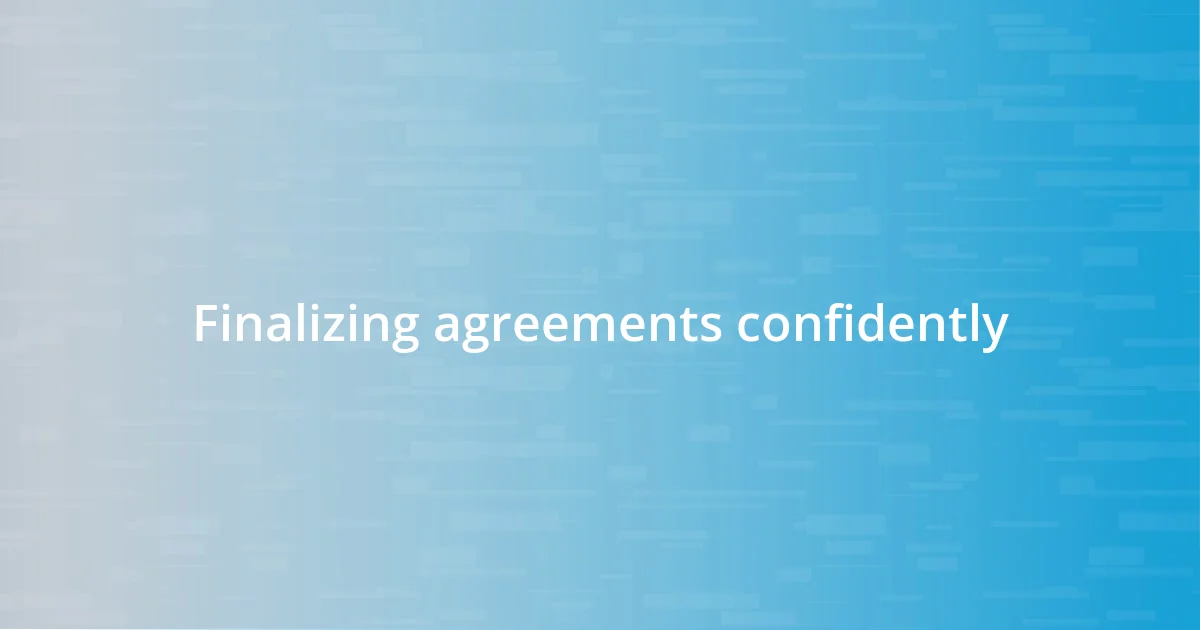Key takeaways:
- Effective negotiation relies on preparation, active listening, and fostering respect to transform confrontations into collaborative dialogues.
- Identifying key repair cost factors—such as parts needed, labor costs, and severity of damage—enhances negotiation strategies and empowers informed decision-making.
- Building rapport with service providers and leveraging competitive quotes can lead to better deals, establishing a cooperative atmosphere for negotiations.

Understanding negotiation basics
When I think about negotiation, I realize it’s not just about haggling over numbers; it’s really a dance of communication. Have you ever felt that rush when you find common ground? It’s exhilarating. Understanding the basics allows you to frame your requests clearly, turning what could feel like a confrontation into a collaborative dialogue.
One essential aspect of negotiation is preparation. I often jot down my priorities and potential compromises before entering discussions. This practice helps me stay focused and confident, rather than getting swept away by emotions. What happens when you walk in unprepared? I’ve learned the hard way that it can lead to missed opportunities and regrettable agreements.
Also, remembering to listen is crucial. During a recent negotiation for repair costs, I found that pausing and actively listening to the other party opened the door for mutual understanding. It transformed the atmosphere from tense to cooperative. Isn’t it fascinating how patience can shift the dynamics of a conversation? In my experience, the best deals come from a space of respect and clarity, rather than pressure and urgency.

Identifying repair cost factors
When I’m identifying repair cost factors, I start by considering the specifics of what needs fixing. It’s like piecing together a puzzle; each element influences the overall picture. For instance, I once dealt with a car repair where the technician suggested replacing the entire transmission. I quickly learned to ask questions about the part’s condition and whether a simpler fix might suffice. That dialogue revealed alternatives I hadn’t considered.
Here are some critical repair cost factors to keep in mind:
- Parts Needed: The condition and availability of replacement parts play a significant role. Rare parts often come at a premium.
- Labor Costs: Experienced technicians charge more, but their expertise can save you from costly mistakes.
- Timeframe: How quickly you need the repair can influence the cost, especially in emergency situations.
- Location: Labor rates can vary widely depending on geographical areas.
- Severity of Damage: A thorough assessment helps gauge whether the repair is minor or major, which directly affects pricing.
Being aware of these factors helps create a more informed negotiation strategy. I find that when I articulate these details during discussions, it boosts my confidence and often leads to a better deal. Remember that knowledge is power!

Researching fair pricing strategies
When researching fair pricing strategies, I often turn to online resources and community forums. It amazes me how much information is available at our fingertips. For example, when I needed to negotiate repair costs for my home, I spent hours checking local service provider websites and comparing prices. I even found reviews that offered insight into what others had successfully negotiated. By gathering data, I felt empowered to make informed arguments during discussions.
I also like to check industry standards and average costs for repairs, which can vary significantly based on location. It’s helpful to use platforms that provide cost estimates, where you can filter by zip code. This not only gives me a benchmark but also reaffirms that I’m seeking a fair deal. When I presented these figures to my contractor, I noticed their demeanor shifted; they recognized that I had done my homework.
In the end, the more transparent I am about repair costs and processes, the better my negotiating position. I always strive to maintain a friendly atmosphere, as this encourages collaboration rather than confrontation. Trust me, when sellers see that you’re knowledgeable, they’re more likely to provide fair pricing.
| Pricing Strategy | Description |
|---|---|
| Research Online | Utilizing community forums and service provider websites to gather information. |
| Check Industry Standards | Comparing average repair costs specific to your location. |
| Transparent Communication | Encouraging open dialogue about pricing with service providers. |

Building rapport with service providers
Building rapport with service providers is crucial for successful negotiations. I recall a time when I approached a mechanic with a tentative demeanor. Instead of diving directly into the issue, I took a moment to ask about their day. That simple conversation shift made them more receptive, and we ended up discussing potential fixes rather than just costs. It felt as if we were collaborating rather than negotiating, which is always a more pleasant experience.
Creating a connection often involves showing genuine interest in the service provider’s expertise. For instance, I once complimented a plumber on a particularly clever solution they devised for a common issue. The pride in their response was palpable, and it opened the door for a more in-depth dialogue. When both parties feel respected, the room becomes more relaxed, allowing for better communication about what truly matters—and what can be negotiated.
Have you ever felt that certain tension when discussing costs? I certainly have, and it can make any conversation uncomfortable. However, I’ve learned that fostering a little friendliness eases the pressure. When the service provider sees you as a person rather than just another client, they might offer insights or even discounts that you wouldn’t have received otherwise. Building that rapport is like finding common ground, making the entire negotiation process not just easier, but more enjoyable too.

Leveraging competitive quotes
Leveraging competitive quotes can be a game-changer when negotiating repair costs. I vividly remember when my roof needed some serious attention. I decided to reach out to multiple contractors to gather quotes. Surprisingly, the range of prices was quite staggering! Armed with this information, I could approach my preferred contractor with a competitive quote from another service. I simply mentioned this without going into a confrontational mode, and just like that, I saw a drop in their initial price.
What I’ve found is that having multiple quotes not only strengthens my position but often encourages service providers to sharpen their pencils. When I once compared quotes from three HVAC specialists, I noticed that one was significantly lower than the others, and their reputability was solid. I didn’t just accept their price; instead, I brought that information into the discussion with my preferred service professional. It was fascinating to see their willingness to offer additional discounts once they knew I was considering other options, emphasizing how competition can drive better deals.
Ultimately, bringing in competitive quotes demonstrates that you’re informed and serious about finding the best value. It can spark a productive conversation, rather than just a haggling session, which I personally find less stressful. Have you ever felt that rush when you make a solid case for a fair price? It’s not just about saving money; it’s about feeling empowered in the negotiation process.

Crafting effective negotiation tactics
When crafting negotiation tactics, it’s essential to approach the conversation from a place of collaboration. For example, I once faced a hefty repair bill that felt overwhelming. Instead of solely focusing on the price, I decided to ask the repair technician to walk me through the costs. This not only clarified what I was paying for but also allowed us to identify areas where adjustments could be made. By framing the discussion as a joint effort to find a solution, we both felt invested in reaching an agreeable outcome.
Another tactic I’ve found incredibly effective involves being transparent about my budget constraints. During a car repair negotiation, I mentioned my limit upfront. The mechanic acknowledged my situation and offered alternative solutions that were both effective and more cost-efficient. This back-and-forth can feel a bit risky, but it often encourages the other party to be more creative with their options. Have you ever shared your budget in a negotiation? I can’t describe how liberating it felt to say it aloud; it shifted the dynamic and opened up a conversation I hadn’t anticipated.
Finally, patience can be a surprisingly powerful negotiation tactic. I remember a time when I didn’t rush into closing a deal for my home repairs. I took my time to weigh my options and sought input from friends who had been through similar negotiations. This pause not only gave me clarity but allowed the service provider to accompany me on this reflection. Isn’t it amazing how a little patience can turn an anxious negotiation into a more thoughtful dialogue? Just like that, what’s intended as mere bargaining shifts into a constructive partnership.

Finalizing agreements confidently
Finalizing an agreement confidently often comes down to how you articulate your needs and expectations. I distinctly remember a time when I was closing a deal for some home renovations. I took a deep breath, looked the contractor in the eye, and clearly established what I wanted—both in terms of quality and pricing. It felt empowering to be direct, and the contractor responded with a newfound respect for our conversation.
Another time, while negotiating with a landscaping service, I found myself reiterating my key points and confirming their understanding of our discussion. This step might seem trivial, but it really solidified our agreement. I asked questions like, “Are you comfortable with this timeline?” This not only helped to ensure we were aligned but also built a sense of trust between us. By making sure we were on the same page, the entire process felt more collaborative, rather than confrontational.
One of my most memorable experiences happened during a garage door repair negotiation. When the technician started explaining the complexity of the job, I nodded and smiled while listening carefully. I responded by sharing my concern about the cost and proposed a payment plan that would work for both of us. Seeing the technician soften as I laid out my thoughts gave me confidence that we’d reach a satisfactory conclusion together. Have you ever felt that moment of clarity when you realize you’re both working toward the same goal? It’s these little wins that transform negotiations into fulfilling partnerships.
















